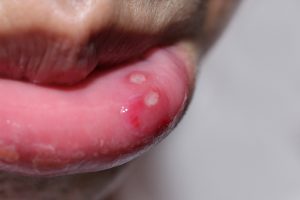Are Canker Sores Contagious?
23 Sep 2016
So you have a canker sore. You’re probably curious whether it is contagious. Can you spread it by sharing food, utensils, and cups? Can you spread it to your significant other? The good news is that canker sores are not contagious. But what is the deal with these mysterious mouth sores? What causes them, how do you know if you have one, and how do you get rid of it?
What is a Canker Sore?
Canker sores are the most common type of mouth sore. These painful sores emerge inside of your mouth. They typically invade parts of the mouth that move, like the inner cheek and lips.
These sores are white or yellow and surrounded by red, inflamed soft tissue. Also known as aphthous ulcers, canker sores usually pop up as a single blemish but will occasionally appear in a small cluster.
There are two types of canker sores. Simple canker sores appear 3 to 4 times a year and last about a week. People ages 10 – 20 are the most affected by simple canker sores. Complex canker sores are less common and affect people who have already had one.
What Causes Canker Sores?
Though doctors know that canker sores are not contagious, they are not completely sure what causes them. Stress or tissue injury is thought to be the main cause of canker sores. If you notice that canker sores always appear during stressful seasons, they may be triggered by the intense stress. The rubbing of dental appliances, braces, dentures, or against the soft tissues in your mouth causes tissue injury. “Certain foods — including citrus or acidic fruits and vegetables (such as lemons, oranges, pineapples, apples, figs, tomatoes, and strawberries) — can trigger a canker sore or make the problem worse.” Complex canker sores are normally caused by underlying health conditions. These include impaired immune systems, vitamin and mineral deficiencies, and gastrointestinal diseases like Crohn’s and Celiac disease. One thing doctors have noticed about these puzzling sores is that they can run in families. So if you are unsure why you keep getting a canker sore, it may be in your genes.

Symptoms
Sometimes people recognize canker sores before they emerge because a tingling or burning precedes the sensation. You may have a canker sore if there is a painful spot in your mouth on the soft tissues like cheeks, soft palate, or tongue. If the spot is white or yellow with a red border, you probably have a canker sore. Complex canker sores will sometimes cause a fever, sluggishness, or swollen lymph nodes.
Is it a Canker Sore or a Cold Sore?
Canker sores and cold sores share several symptoms and are easily confused. But they are not the same, and each has its own recommended treatment. Cold sores, fever blisters, or herpes simplex type 1 are fluid-filled blisters. Unlike canker sores, a virus causes these sores, and they are contagious. If you have a strange sore and don’t know what it is, take note of its location. Canker sores appear inside the mouth, but cold sores form outside the mouth. Cold sores will form under the nose, around the lips, and under the chin.
Treatment
The pain of a canker sore will subside in 7-10 days, and it will disappear on its own in 1-3 weeks. While you wait it out, over-the-counter pain medications can relieve the discomfort of a canker sore. You’ll want to avoid spicy and acidic foods that will irritate the open wound. Scratchy foods like nuts, chips, and toast can also provoke the sore by rubbing and scratching it as you chew. There are a lot of home remedies and family secrets passed among generations that claim to quickly heal canker sores. There is no medical evidence that supports these treatments, but if grandma says it will help, there is no harm in trying.
If you have a sore that persists beyond 10 days, you should set up an appointment with a dentist to look into additional treatment options. There are topical medicines and mouthwashes that can sooth difficult sores. Additionally, if you notice an unusually large sore, an outbreak of sores, excruciating pain, a rash, high fever, or a headache, you should immediately call your doctor or dentist. These symptoms are not normal for a straightforward canker sore.
Canker sores are generally harmless, besides the pain, and will naturally disappear. But, if you have a sore that seems unusual, you should talk to a dentist. If you are repetitively dealing with canker sores, you may want to ask your dentist how you can prevent their occurrence. Other than the unusual causes, these sores are a mystery that occurs to most people at least once in their lives. But they are not contagious, or harmful, so don’t fret!
Related Blog Articles